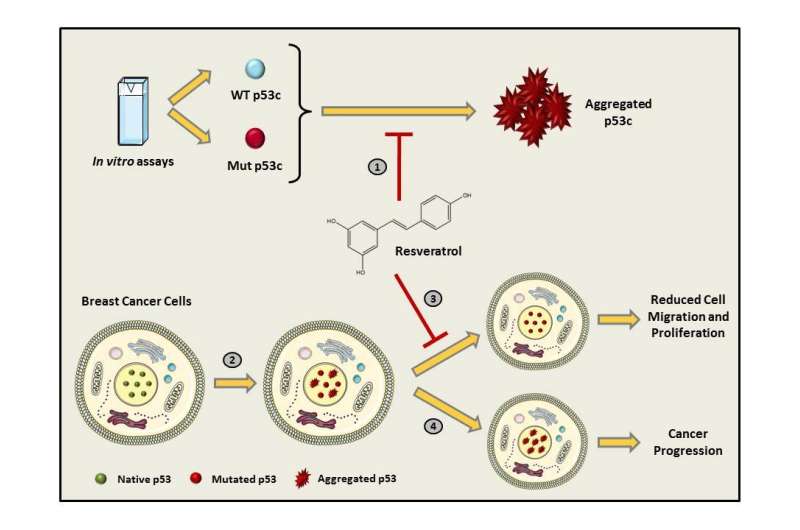Substance in grapes prevents agglomeration of a mutant protein that leads to cancer

Researchers at the Federal University of Rio de Janeiro (UFRJ) and the State University of Rio de Janeiro (UERJ) have made a discovery that could lead to the development of a treatment against more than half of breast cancer cases. Using resveratrol, a bioactive compound found in grapes and red wine, scientists were able for the first time to inhibit the agglomeration of mutant versions of the p53 protein, a structure present in about 60 percent of tumors, and to prevent migration and proliferation of breast cancer cells.
The potential anti-cancer effects of resveratrol have been known for years, but to date, no study has been able to show that the substance can act to reduce tumors caused by the aggregation of the mutant form of tumor suppressor p53. The Brazilian scientists are the first to obtain this result in the laboratory.
Because they are found in more than half of malignant tumors, amyloid aggregates of mutant p53 are considered novel strategic targets in the fight against cancer. In its normal, unmutated version, the protein is responsible for the suppression of tumor cells, and for this reason is often referred to as "guardian of the genome." A mutant p53, however, can lose that function and gain others, sequestering its normal counterparts and contributing to the formation of amyloid aggregates, structures of difficult degradation and rapid growth. Some p53 mutations are extremely pathogenic, while others are harmless.
The laboratory of Professor Jerson Lima Silva has been investigating the amyloid aggregation of p53 for two decades. The main goal of this group is to understand the mechanisms that allow aggregates of mutant p53 to contribute to cancer and to find an effective way to prevent it from forming.
"The findings bring scientists closer to the development of a drug capable of acting directly on the amyloid aggregation of the mutant p53," says Danielly C. Ferraz da Costa, a co-author of the study, from the Institute of Nutrition of UERJ and a member of the INBEB. She began studying the properties of resveratrol for her doctoral thesis, and by 2012 had already investigated the anticancer protection by resveratrol in lung tumor cells.
The researchers applied fluorescence spectroscopy techniques in vitro to test the antitumor potential of resveratrol in aggregations of wild and mutant p53. In addition, they used immunofluorescence co-localization assays to test the action of the substance on breast cancer cells with different p53 mutants (MDA-MB-231 and HCC-70) and normal p53 (MCF-7). Decreased aggregation of mutated p53 was observed in tumors implanted in mice. The group is now studying various molecules derived from resveratrol that can be used in therapy against tumors containing mutated p53.
The paper, titled "Resveratrol prevents p53 aggregation in vitro and in breast cancer cells," is published online in Oncotarget.
More information: "Resveratrol prevents p53 aggregation in vitro and in breast cancer cells" Oncotarget (2018). DOI: 10.18632/oncotarget.25631 , www.oncotarget.com/index.php?j … article&op=view&path%5B%5D=25631&path%5B%5D=80217
















